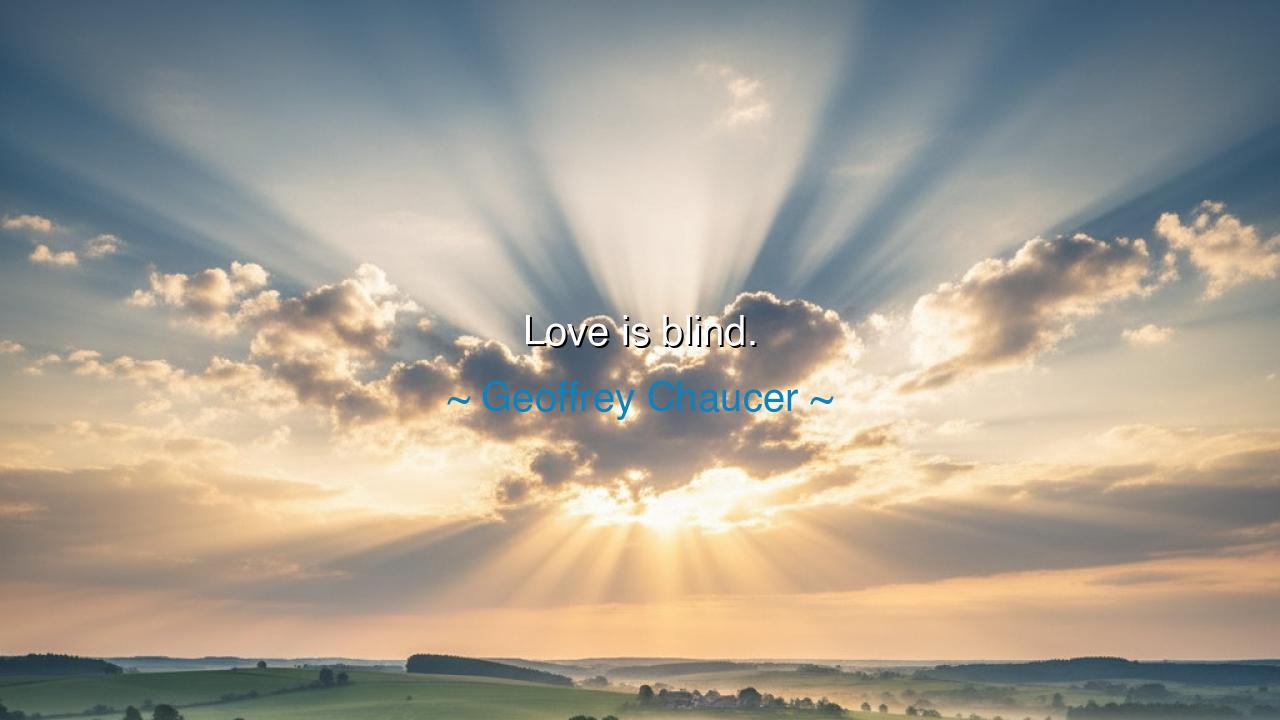
Love is blind.






When Geoffrey Chaucer first wrote the words “Love is blind” in his Merchant’s Tale during the fourteenth century, he was not merely crafting a proverb — he was revealing an eternal truth of the human heart. For Chaucer, the father of English literature, knew that love is both the sweetest gift and the most mysterious madness known to mankind. To say that “love is blind” is to confess that once the heart is seized by affection, reason no longer holds its throne. The eyes of logic dim, and the soul begins to see with a different light — one that shines not upon flaws, but upon dreams.
In Chaucer’s time, courtly love was a sacred yet dangerous art. It exalted passion as divine, yet warned of its power to deceive. His phrase captured the folly and the glory of those who love beyond reason. To say love is blind is not merely to say that lovers ignore faults — it is to say that love itself transcends the senses. It does not rely upon what is seen, measured, or proven. It is a force that defies judgment, because it is born not of the mind, but of the soul. In this blindness lies both its beauty and its peril.
Throughout the ages, poets and philosophers have wrestled with this same paradox. The Greeks saw it in Eros, the god who struck without warning, leading kings to ruin and heroes to glory. In the myths, even mighty Zeus bowed to desire’s blindness, for love makes all beings — mortal and divine — equal in vulnerability. When the heart is captured, the eyes no longer discern status or flaw; they see only what the soul yearns for. Love’s blindness is the great equalizer of the human condition — humbling the proud, ennobling the humble, binding the wise and the foolish alike in the same sweet chain.
Consider the story of Cleopatra and Mark Antony, whose love shook the pillars of empires. Both knew that their union defied politics, reason, and duty — yet they surrendered to it. Their love was not rational; it was fated. And though it led them to ruin, history remembers them not for their downfall, but for the grandeur of their devotion. Their blindness was not ignorance — it was courage. They chose to see not the boundaries of the world, but the boundlessness of their hearts. Thus, even in tragedy, their love became immortal.
But there is another side to Chaucer’s wisdom — a warning whispered beneath the poetry. Blind love, when untamed, can lead to suffering. When we see only the ideal, we forget the truth. Love’s blindness, if left unchecked, can turn into illusion — a mirror reflecting not the beloved, but our own desires. Many have loved not the person before them, but the dream they wished that person to be. And when the dream breaks, the blindness lifts, and the heart, once aflame, is left in ashes. To love wisely, therefore, one must learn to balance passion with perception — to open the eyes of the heart without closing the eyes of truth.
Yet even in its folly, love’s blindness is sacred. For it is blindness that allows forgiveness, tenderness, and mercy to exist. Were love not blind, it could never endure imperfection. Parents love their children despite their faults; friends stand by each other despite their differences; lovers see beauty where others see scars. The blindness of love is not always ignorance — sometimes it is grace, a divine gift that teaches us to see beyond judgment into the essence of another soul.
So, my child, remember this lesson: to love is to risk blindness, but not to love is to remain blind forever. Do not fear love’s blindness, for it opens a deeper sight — the sight of the heart. Love not with the cold precision of reason, but with the courage to see goodness where others see flaws. Yet guard your love with awareness; let your eyes be open even as your heart dreams. For the truest love is not that which refuses to see faults, but that which sees them — and loves still.
Thus, as Chaucer taught, “love is blind” — and in that blindness lies the divine mystery of being human. It is the blindness that allows us to see beauty in imperfection, to forgive the unforgivable, and to give ourselves fully despite the risks. For love, though blind, is the only vision that reveals the truth of the soul.






AAdministratorAdministrator
Welcome, honored guests. Please leave a comment, we will respond soon